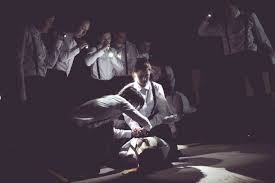Project Colony
By TOBY LICHTIG
"Are you here
for the party?", asks the girl.
She's wearing red
lipstick, a summer frock and an expression of benign wonderment. We tell her we
are.
"Oh
good!" she cries, clapping her hands. "We're so excited!"
We've arrived at The Colony, the penal settlement of Kafka's
imagination, now relocated to Trinity Buoy Wharf, just opposite the Millennium Dome, on the north bank of the
Thames. This place is rich in London
history; it is the site of the city's only lighthouse, as well as the former
workplace of Michael Faraday. Tonight, however, the wharf has become a faraway
British outpost, its development arrested at some point in the 1950s.There are
around eighty other guests and twenty wide-eyed natives.
"We've never left the island", one girl confides to
us. "Our parents used to tell us all about life in England."
We're led to a former chain warehouse, kitted out with balloons,
a stage, a bar and round tables. Locals chat to us. One mentions that times
have changed. Things are looking up. The former Commandant of The Colony was
not a nice man. But his replacement is kinder. He wears a striped shirt,
a thin moustache and has the air of a hotelier at a British postwar seaside resort.
We sit down and have a drink.
Suddenly the mood changes. Several more locals arrive, dressed in white shirts and braces, silent and
menacing; they beckon for a group of us to leave. We're led out,
along the wharf, the City of London glimmering in the charcoally pink dusk, and
down a flight of stairs to a dark basement, where an ominous torture contraption lies
in the centre of the room. We take our seats and watch on as a weary traveller,
dragging a wheely case, is introduced by an army officer to the mechanics of
the elaborate apparatus. In the corner, an uncomprehending prisoner
awaits her just deserts.
Fourth Monkey’s Project Colony is an innovative reworking of Kafka's 1914 short story
"In the Penal Colony", and an excellent evening out. The basement
play itself is an impressive dramatization of the text, but what makes the
event so compelling is the theme of complicity that it teases out. We are both
revellers and spectators, audience and participants, drawn into the
action. Like Kafka’s “explorer”, we are encouraged to question our role as tourist
or agent of change. As the explorer comments in the original story: “It was
always a ticklish matter to intervene decisively in other people’s affairs”.
After the first part of the play – which ends with a strap
breaking off the device, much to the chagrin of the eager executioner – we are
led back upstairs, swapping places with another group of guests. We have some more
drinks and play a game of pick-up sticks. There are lollipops for the winners
and then a quiz. A band plays a couple of songs.
Later, we are rejoined by everyone from the basement, including
the other half of the audience. Kafka’s sinister tale resumes. The
officer must come to terms with the obsolescence of his mechanism and the
inhabitants of the colony are confronted with the results of their inertia.
Even if the play becomes rather baggy at this point, with several inadvisable interpretative liberties, and the acting isn’t quite
first-rate (shouting seems to be an all-too-ready
substitute for projecting), our role as uncomfortable witnesses is emphatically
underlined. With an audience-cast ratio of 3–1, we are pleasingly
immersed by the drama. We are strangers in a strange land, unsure of our
function, stuck somewhere between a party and a nightmare.
Peter Stothard's Blog
- Peter Stothard's profile
- 30 followers




